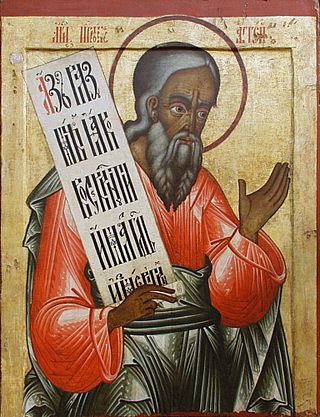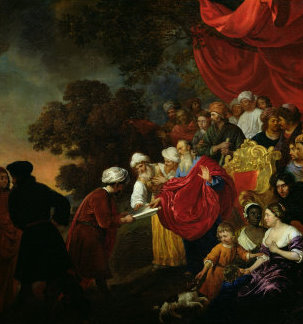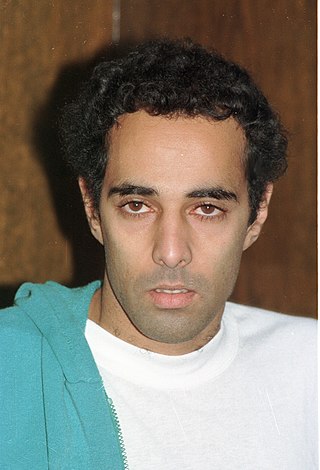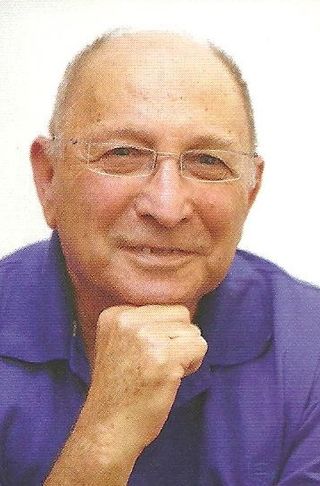The Book of Haggai is a book of the Hebrew Bible or Tanakh, and is the third-to-last of the Twelve Minor Prophets. It is a short book, consisting of only two chapters. The historical setting dates around 520 BC, before the Temple had been rebuilt. The original text was written in Biblical Hebrew.
The Book of Malachi is the last book of the Neviim contained in the Tanakh, canonically the last of the Twelve Minor Prophets. In most Christian orderings, the grouping of the prophetic books is the last section of the Old Testament, making Malachi the last book before the New Testament.
The Book of Zechariah is a Jewish text attributed to Zechariah, a Hebrew prophet of the late 6th century BC. In the Hebrew Bible, the text is included as part of the Twelve Minor Prophets, itself a part of the second division of that work. In the Christian Old Testament, the Book of Zechariah is considered to be a separate book.

Haggai or Aggeus was a Hebrew prophet during the building of the Second Temple in Jerusalem, and one of the twelve minor prophets in the Hebrew Bible and the author of the Book of Haggai. He is known for his prophecy in 520 BCE, commanding the Jews to rebuild the Temple. He was the first of three post-exile prophets from the Neo-Babylonian Exile of the House of Judah, who belonged to the period of Jewish history which began after the return from captivity in Babylon. His name means "my holidays."
The Nevi'im is the second major division of the Hebrew Bible, lying between the Torah and Ketuvim. The Nevi'im are divided into two groups. The Former Prophets consists of the narrative books of Joshua, Judges, Samuel and Kings; while the Latter Prophets include the books of Isaiah, Jeremiah, Ezekiel, and the Twelve Minor Prophets.

According to the Biblical narrative, Zerubbabel was a governor of the Achaemenid Empire's province of Yehud and the grandson of Jeconiah, penultimate king of Judah. Zerubbabel led the first group of Jews, numbering 42,360, who returned from the Babylonian captivity in the first year of Cyrus the Great, the king of the Achaemenid Empire. The date is generally thought to have been between 538 and 520 BC. Zerubbabel also laid the foundation of the Second Temple in Jerusalem soon after.

Yigal Amir is an Israeli right-wing extremist who assassinated incumbent Prime Minister of Israel, Yitzhak Rabin on November 4, 1995, at the conclusion of a rally in Tel Aviv, Israel. At the time of the murder, he was a law student at Bar-Ilan University. Amir is serving a life sentence for murder plus six years for injuring Rabin's bodyguard. He was later sentenced to an additional eight years for conspiracy to murder. Amir has never expressed regret over the assassination.
Rud Hud Hudibras was a legendary king of the Britons as recounted by Geoffrey of Monmouth. He came to power in 974BC.
Hagai Shaham is an Israeli violin virtuoso. He began studying the violin at the age of six and was the last student of the late Professor Ilona Feher. He is also a violin teacher, a professor at the Buchmann-Mehta School of Music, in the Faculty of Arts at Tel Aviv University, and an artist-in-residence at Stony Brook University.
Hagai Amir is the brother and accomplice of Yigal Amir, the assassin of Yitzhak Rabin.
The Sapir Prize for Literature of Israel is a prestigious annual literary award presented for a work of literature in the Hebrew language. The prize is awarded by Mifal HaPayis, and is a part of the organization's cultural initiatives. It bears the name of the late Pinhas Sapir, a former Finance Minister of Israel, and was first awarded in 2000.

Beit Hagai, also Hagai, is an Israeli settlement organized as a community settlement located in the southern Hebron Hills in the West Bank. The settlement population was 460 in 2004, according to a classified government document published by the Haaretz newspaper, and lies within the municipal jurisdiction of the Har Hevron Regional Council. The religious Jewish community's name, Haggai, is an acronym of the given names Hanan Krauthammer, Gershon Klein, and Yaakov Zimmerman, three Nir Yeshiva students murdered in the 1980 Hebron terrorist attack. The community rabbi for Beit Hagai is Rabbi Moshe Eliezer Rabinovich (HaLevy). In 2022 it had a population of 725. The international community considers Israeli settlements in the West Bank illegal under international law, but the Israeli government disputes this.

Haggai Erlich is professor emeritus at Tel Aviv University and an academic adviser at the Open University of Israel where he is the head of Middle Eastern History studies. He is the Landau Prize recipient for 2010 in African Studies.

The Tel Aviv gay centre shooting resulted in the deaths of two people and injuries to at least fifteen others at the Tel Aviv branch of the Israeli LGBT Association, at the "Bar-Noar", on Nahmani Street, on August 1, 2009. A 26-year-old man and a 17-year-old girl were killed. Three deaths were mentioned in earlier reports of the incident but one has since been discounted.
The August 2010 West Bank shooting attack was an attack near the Israeli settlement of Kiryat Arba in the Israeli-occupied West Bank, carried out by Hamas militants. Four Israeli settlers from the settlements of Beit Hagai and Efrat were killed after militants attacked their vehicle. It was the deadliest Palestinian attack on Israelis in over two years.

On 2 May 1980, six Jews – three Israelis, two American Israelis, and one Canadian – were killed, and another 20 Jews were injured at 7:30 pm on a Friday night as they returned home from Sabbath prayer services at the Cave of the Patriarchs in Hebron. Five of the six killed were yeshiva students aged 20–21. They were attacked with gunfire and grenades from the rooftops around a small alley.

Hagai Segal is an Israeli author and journalist, former editor of the Makor Rishon newspaper, who was convicted as a member of terrorist organization.

Haggai Carmon is an attorney, author of intelligence thrillers, and legal advice columnist. Carmon represented the United States in Israeli civil litigation (1985–2016) and acted as outside legal counsel to the U.S. Embassy in Tel Aviv, Israel, and the U.S. Consulate General in Jerusalem. For twenty years (1985–2005) he worked for U.S. federal agencies to conduct intelligence gathering, a task he performed under cover in more than thirty countries.
Shaham or Shacham is a Hebrew surname. Notable people with the surname include:








